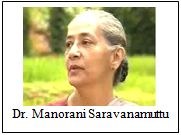SRI LANKA: A tribute to Sunila Abeyesekara

 |
 |
|---|
Sunila Abeysekera passed away yesterday in Colombo. Born in 1952 she stood for the liberal values of equality, liberty and human rights at a very dark period in her country. By 1962, at the age of ten, a section of the country’s elite attempted a military coup. This coup symbolised the disillusionment of an important section of the country’s elite with democracy. The idea that some form of authoritarianism was needed for the country was expressed through this attempted coup. Though the coup failed the idea that authoritarianism might better suit the country than democracy did not fade away. By 1972, even the political parties which represented labour attempted to experiment some kind of leftist authoritarianism through the coalition government. They went to the extent of curtailing the power of the Supreme Court by removing the powers of judicial review. This was the first open attack on the independence of the judiciary. By 1978 a more complete form of authoritarianism was expressed through the constitution itself. Ever since, the country’s politics have moved to ever darkening authoritarianism. The adult life of Sunila Abeysekera was lived in this bleak period. She stood with those who stood for democracy and justice. Those who belonged to this category were often maligned and even portrayed as traitors. Supporting authoritarianism continued to be portrayed as patriotic. This mistreatment by her own people did not deter her and she stood to the last, true to the ideals of democracy.
It is perhaps symbolic that during the latter years of her life she had to put a struggle against cancer. Perhaps that was symbolic of a far deeper cancer of an entire nation that she witnessed throughout the better part of her life and against which she did whatever she could to combat together with others.
This is not an occasion to make a comprehensive assessment of her life. However, we must record, perhaps one of her most remarkable contributions. This was her courage to become a public spokesman during the period that is known as the period of terror, particularly between 1987 and 1991. This was a period in which large scale enforced disappearances took place in the country. There was an atmosphere of fear which intimidated many subduing them into silence.
Dr. Manorani Saravanamuttu, together with Sunila Abeysekera became the public speakers on behalf of the mothers of the disappeared persons during this time. A documentary produced by Nimal Mendis entitled, Three Women Speak, bears moving testimony to their courageous and compassionate commitment on behalf of the families of the disappeared from around the country. Dr. Manorani Saravanamuttu was one of the unsung heroes of this time and Sunila stood with her. That original movement of the mothers of the disappeared needs to be recalled and better remembered with more awareness than it is now. It was unfortunate that unscrupulous persons took advantage of this movement and undermined it by trying to achieve their own limited political aims.
Together with her friends the Asian Human Rights Commission salutes Sunila and we extend our condolences to her family.
To support this case, please click here: SEND APPEAL LETTER



